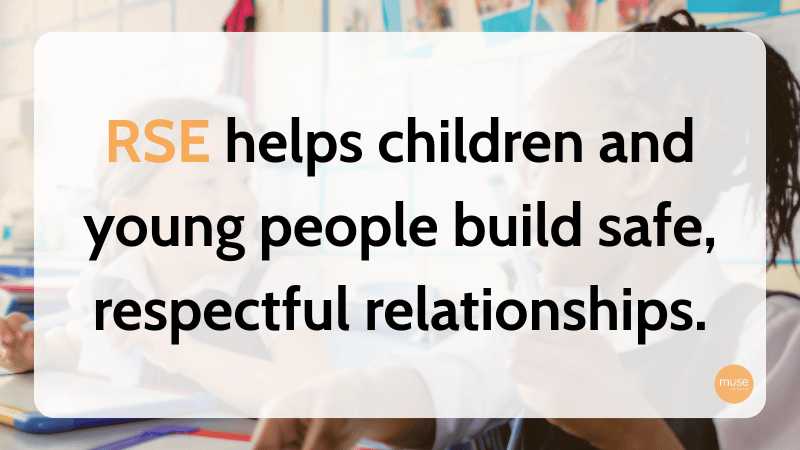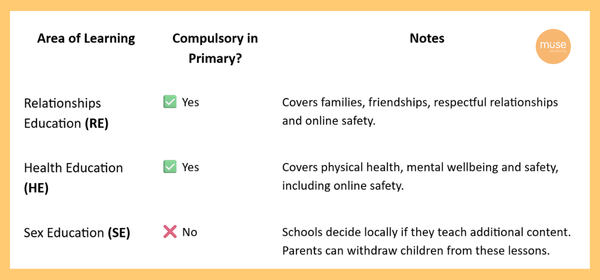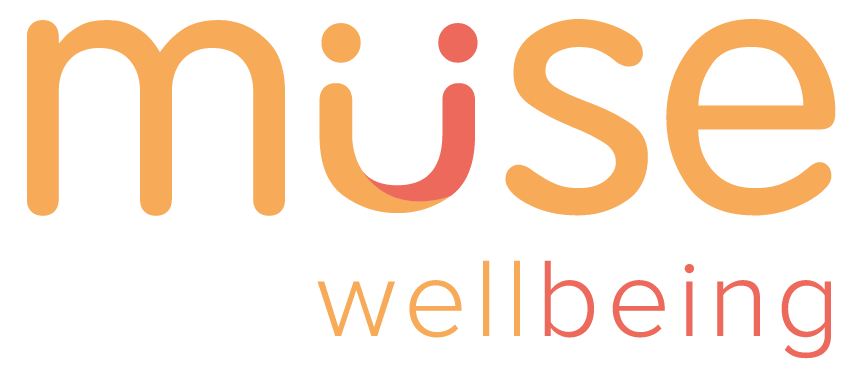What Does RSE Stand For?
Sep 17
/
Muse Wellbeing

Author: David
David is the Muse Wellbeing director and lead curriculum developer. His Main passions include education, surfing and travelling.
David is the Muse Wellbeing director and lead curriculum developer. His Main passions include education, surfing and travelling.

Edited/Reviewed: Tashia
Tashia is a SENCO and LSA support lead with a love for inclusive education. An avid gardener, she enjoys the outdoors and hiking.
Relationships and Sex Education (RSE) is now a statutory part of the primary curriculum in England. It helps children build safe and respectful relationships, understand the changes they experience as they grow, and make informed choices about their health and emotional wellbeing. Lessons are designed to be age-appropriate and delivered with sensitivity, ensuring every child feels supported in their learning.
RSE provides pupils with the knowledge and skills they need to develop confidence, stay safe, and form positive relationships. It complements wider school priorities around wellbeing and safeguarding, ensuring children are prepared for life’s opportunities and challenges.
What Does RSE Stand for in Education?
RSE stands for Relationships and Sex Education, an essential topic of learning delivered within the wider Personal, Social, Health and Economic (PSHE) curriculum. It gives children the opportunity to explore topics such as family, friendships, respect, and personal safety in a safe and supportive environment.

Muse Wellbeing provides carefully developed resources and learning materials that help children learn to build positive, respectful relationships. RSE aims to teach the following important life skills by the end of primary school:
Families and close relationships that care for them
Caring friendship
Respectful relationships
Being safe
Safety in online and real world interactions
As of 2020, Relationships and Sex Education in primary schools is now a statutory subject, alongside Health Education. RSE Government Guidance 2025 requires schools to provide a relevant, appropriate Sex Education curriculum in the UK as part of their whole school PSHE (Personal, Social and Health Education) curriculum.
PSHE vs RSE: What’s the Difference?
PSHE is a broad subject covering health, money, and citizenship. RSE is the statutory element within PSHE that focuses on relationships, safety, and age appropriate sex education. While PSHE as a whole is not compulsory, RSE is a legal requirement, ensuring all children benefit from its core content.
In practice, PSHE is the overarching area and topic of learning that supports children’s personal care, social skills and citizenship (local and global). RSE sits within this framework and is often delivered as part of a weekly timetabled PSHE lesson.
Teaching RSE in Primary Schools
Effective RSE in primary schools is carefully sequenced, matching each child’s stage of development. Lessons cover families, friendships, safety, and emotional wellbeing for younger pupils, while older pupils are supported to understand the physical and emotional changes of puberty.
A large majority of children today have quick and easy access to online information, which is not always reliable or age-appropriate. RSE gives pupils a safe and supportive space to ask questions and explore sensitive topics. This helps students build confidence, develop resilience and learn strategies to stay safe both online and offline.
A large majority of children today have quick and easy access to online information, which is not always reliable or age-appropriate. RSE gives pupils a safe and supportive space to ask questions and explore sensitive topics. This helps students build confidence, develop resilience and learn strategies to stay safe both online and offline.
Is RSE Compulsory in Primary Schools?
Yes, most elements of RSE are compulsory learning topics in primary schools, though it can be confusing to understand exactly which parts.
RSE is sometimes referred to as RSHE, which stands for Relationships, Sex and Health Education. Within this, Relationships Education (RE) and Health Education (HE) are compulsory for all pupils. Sex Education (SE) is not compulsory in primary schools, and each school decides locally whether to teach it beyond the statutory content.

Muse Wellbeing has developed curriculum resources for Years 1-6, ensuring schools meet and exceed the latest statutory requirements. These resources are designed to help teachers with lessons that are both safe and engaging, while supporting pupils’ wellbeing.
Main Topics Covered in RSE Lessons
Alongside the many core areas already explored, RSE also supports children to develop emotional literacy, learn how to communicate and resolve conflict, and respect diversity within their school and wider community. These skills link closely to safeguarding and help pupils prepare for the transition to secondary school. Key topics include:
- Healthy Relationships: Pupils learn how positive relationships support wellbeing and how to set safe, respectful boundaries with friends and family.
- Healthy Relationships: Pupils learn how positive relationships support wellbeing and how to set safe, respectful boundaries with friends and family.
- Consent and Respect: Children are taught the importance of personal boundaries, why respect matters in every relationship, and that everyone has the right to feel safe.
- Families and Friendships: Lessons highlight the role of supportive families and friendships, showing how kindness, respect and clear boundaries help these relationships to thrive.
- Staying Safe (including Online Safety): Pupils explore how to recognise risks both online and offline, and they are encouraged to seek help from a trusted adult if they ever feel unsafe.
- Puberty and Body Changes: As pupils grow older, they learn in an age-appropriate way about the physical and emotional changes of puberty and how to manage these confidently.
Relationships Education and Pupil Wellbeing
RSE supports wellbeing by teaching children to manage feelings, build positive relationships and understand their own bodies, which fosters self esteem. RSE helps children’s social and emotional growth by giving them the skills to build respectful, positive relationships. These ideas also connect with the Six Ways to Wellbeing, which explore the wider experiences that support children as they grow and develop.
Why is RSE Important?
A strong RSE curriculum helps students feel supported and respected as they develop. It promotes positive physical and emotional health, builds resilience, fosters self-esteem and helps young people navigate the physical and emotional changes as they grow.
Lessons are designed to give pupils the understanding and confidence to build positive relationships with friends and family. RSE also helps them to stay safe both online and offline and to look after their mental health.
Developing an RSE School Policy
Every school must have an up-to-date RSE policy. This is a statutory requirement set out by the Department for Education in its 2019 statutory guidance, which came into effect from September 2020. The policy must explain what is taught, when it is taught and how parents are consulted, and it must be available for parents, carers and others to view.
A strong policy provides clarity on lesson content and who is responsible for delivery, ensuring consistency and transparency. It also shows how RSE supports children to develop the knowledge and skills they need for a safe, healthy and successful life.
How Muse Wellbeing Supports RSE in Schools
Muse Wellbeing offers high-quality resources and a complete PSHE and RSE curriculum that helps schools deliver learning effectively. The curriculum is fully aligned with Department for Education statutory guidance and covers Years 1–6.
Schools wishing to strengthen their provision can work with Muse Wellbeing to access trusted resources and professional support. Sign up today for full curriculum access.
FAQs - RSE Education in Primary Schools
What does RSE stand for in Education?
RSE stands for Relationships and Sex Education. In primary schools in England, only Relationships Education (RE) is compulsory. In secondary schools, the full RSE curriculum, including sex education, must be taught.
RSE stands for Relationships and Sex Education. In primary schools in England, only Relationships Education (RE) is compulsory. In secondary schools, the full RSE curriculum, including sex education, must be taught.
What is RSE in primary schools?
RSE in primary schools focuses on relationships education, helping children learn about families, friendships, respect and safety in an age-appropriate way.
Who teaches RSE in schools?
RSE is usually delivered by classroom teachers, with support from PSHE leads or, where appropriate, external specialists.
What is the difference between RSE and sex education?
RSE covers wider teaching on relationships, wellbeing and respect, while sex education is limited to biological and reproductive content.
Is RSE compulsory in primary schools?
Relationships Education and Health Education are statutory in all primary schools, but Sex Education is not compulsory and is decided by individual schools.
How are parents involved in RSE?
Schools must have an up-to-date RSE policy and consult with parents when developing or reviewing it, ensuring families understand what will be taught.
At what age do children learn about puberty?
Teaching about the physical and emotional changes of puberty usually begins from Year 4 onwards, with earlier years exploring simple ideas of growth and change.
Muse Wellbeing
Subscribe for RSHE & Wellbeing Updates & Learning Resources
Receive essential information on RSHE and wellbeing for your school and community
Thank you!

Copyright © 2026 Muse | All Rights Reserved.
Would you like to logout of Muse Wellbeing?


